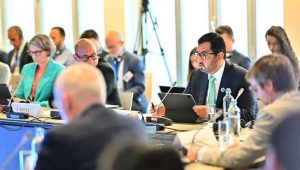Countries at this year’s U.N. climate summit must face up to how far behind they are lagging on climate change targets and agree a plan to get on track, the United Arab Emirates’ incoming president of the event said on Thursday, July 13, 2023.

In a speech laying out the country’s plan for the COP28 summit, to be held in Dubai in November and December, Sultan Al Jaber said at the 7th Ministerial Meeting on Climate Action (MOCA) in Brussels that the event should also yield international goals to triple renewable energy, double energy savings and hydrogen production by 2030.
“We must be brutally honest about the gaps that need to be filled, the root causes and how we got to this place here today,” Al Jaber told the meeting in the Belgium capital comprising climate ministers and officials from countries including Brazil, China, the United States and European Union members.
“Then we must apply a far-reaching, forward-looking, action-oriented and comprehensive response to address these gaps practically,” Al Jaber said, even as he stressed the need to keep global heating below 1.5°C, serving as the summit’s “North Star”.
The COP28 summit will be the first formal assessment of countries’ progress towards the Paris Agreement’s target to limit climate change to 1.5 Celsius (34.7 Fahrenheit) of warming. Countries’ current policies and pledges would fail to meet that goal.
“We can’t afford a meaningless stocktake. This is about accountability of our previous, present and future updates,” Canadian Climate Minister, Steven Guilbeault, told Thursday’s meeting.
The assessment at COP28 – known as the Global Stocktake – will increase pressure on major emitters to update their actions to cut greenhouse gas emissions.
Al Jaber said all governments should update their emissions-cutting targets by September, which the UAE did last month.
The UAE, a major OPEC oil exporter, has been under pressure to lay out its vision for the COP28 summit and guide preparations among the nearly 200 countries expected to attend.
A round of preparatory United Nations climate negotiations in June yielded little progress. Countries spent days wrangling over issues including whether to even discuss urgent CO2-cutting action – known in U.N. jargon as the “mitigation work programme”.
Al Jaber, who is also the head of UAE state-owned oil company ADNOC, said the COP28 summit also aims to establish a promised fund to compensate poorer countries where climate change is inflicting irreparable damage.
Countries finally agreed at last year’s U.N. climate talks to form the “loss and damage” fund – but left the toughest decisions for later, including which countries should pay into it.
Finance has dominated recent climate negotiations, as poorer nations demand greater support to both invest in low-carbon energy and cope with spiralling costs from droughts, floods and rising sea levels.
Al Jaber called for a “comprehensive transformation” of international financial institutions to unlock more capital to tackle climate change – echoing ideas put forward by climate-vulnerable nations including the Barbados-led “Bridgetown Initiative” to reform multilateral finance institutions.
The COP28 president’s speech has been attracting comments from industry experts and observers.
Harjeet Singh, Head of Global Political Strategy, CAN International, said: “COP28 President Al Jaber today outlined the plan emphasising efforts to keep warming below 1.5C as the central focus of the climate summit.
“We are already experiencing the hottest days in over 125,000 years. We are witnessing record-shattering heatwaves, floods, and wildfires at 1.2C warming. It is clear that the time has come to end the era of fossil fuels. COP28 must initiate a roadmap for a just and equitable transition that benefits workers and communities and supports the countries least responsible for the climate crisis.
“This needs to occur alongside establishing ambitious targets for renewable energy and the scaling up of finance to implement climate action and support those suffering from climate-induced loss and damage.”
Alex Rafalowicz, Executive Director of the Fossil Fuel Non-Proliferation Treaty Initiative, said: “Al Jaber already recognised himself that the end of fossil fuels is inevitable. The question is how? If COP28’s main goal is to ensure we honour the commitment to 1.5°C, this can only be achieved by a commitment to stop any new fossil fuel projects from today.
“The UAE should do this, and the USA should do this, every country must. So called ‘climate leaders’ need to stop using these forums as a performance stage and stop new fossil fuel projects – that is the test. The COP must work with and support the real leadership of countries like the Pacific nations and Colombia, that want to end fossil fuels – fast, fair and forever.”
